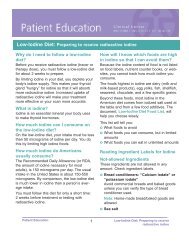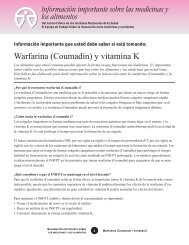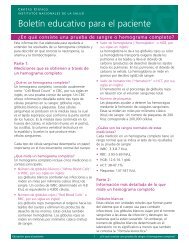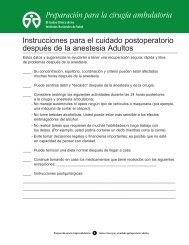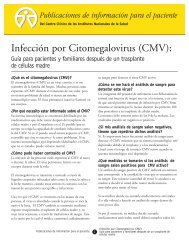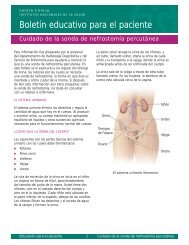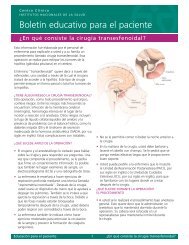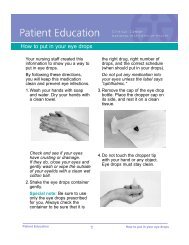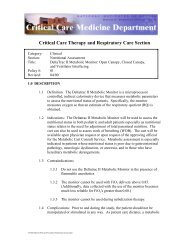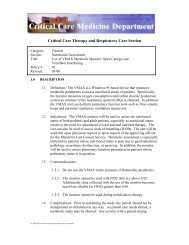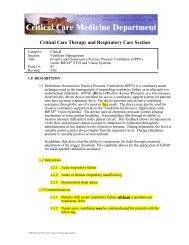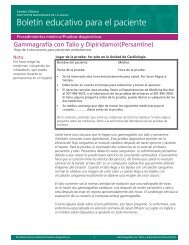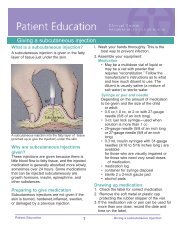Managing Adrenal Insufficiency - National Institutes of Health
Managing Adrenal Insufficiency - National Institutes of Health
Managing Adrenal Insufficiency - National Institutes of Health
Create successful ePaper yourself
Turn your PDF publications into a flip-book with our unique Google optimized e-Paper software.
<strong>Managing</strong> <strong>Adrenal</strong> <strong>Insufficiency</strong><br />
This information was developed by the<br />
patient care staff <strong>of</strong> the Clinical Center to<br />
help patients with adrenal insufficiency<br />
(AI) understand their condition and how to<br />
take care <strong>of</strong> it. It explains what causes<br />
adrenal insufficiency and how it can be<br />
controlled. If left untreated, adrenal insufficiency<br />
can cause serious illness or<br />
death. But by working with their doctors<br />
and nurses, patients can learn how to<br />
manage this condition.<br />
What are the adrenal<br />
glands?<br />
Your body has two adrenal glands. Each<br />
gland is located above a kidney. The<br />
adrenal glands secrete many hormones<br />
needed for the body's normal functioning.<br />
People with AI do not have enough <strong>of</strong> the<br />
hormones cortisol and aldosterone.<br />
Cortisol helps the body use sugar and<br />
protein for energy and enables the body<br />
to recover from infections and stresses<br />
(for example, surgery, illness).<br />
Aldosterone maintains the right amount<br />
<strong>of</strong> salt, potassium, and water in the body.<br />
What is adrenal<br />
insufficiency?<br />
<strong>Adrenal</strong> insufficiency means that there is<br />
not enough cortisol. Some causes <strong>of</strong> AI<br />
also lead to low aldosterone levels.<br />
Without the right levels <strong>of</strong> these hormones,<br />
your body cannot maintain essential<br />
life functions.<br />
<strong>Adrenal</strong> insufficiency may be permanent<br />
or temporary. When AI is permanent,<br />
medication must be taken daily for the<br />
rest <strong>of</strong> the patient's life.<br />
Causes <strong>of</strong> permanent AI include the<br />
following:<br />
� Addison’s Disease<br />
� Congenital adrenal hyperplasia<br />
(CAH) discovered in childhood<br />
� complete surgical removal <strong>of</strong> the<br />
pituitary gland<br />
� surgical removal <strong>of</strong> the adrenals<br />
Temporary adrenal insufficiency is<br />
brought on by some medications, infections<br />
or surgeries, or when the proper<br />
medication is not taken. Causes <strong>of</strong> temporary<br />
AI include the following:<br />
� transsphenoidal surgery for Cushing<br />
disease that removes a tumor from the<br />
pituitary gland<br />
� removal <strong>of</strong> a tumor that has been<br />
causing the adrenal glands to make too<br />
much cortisol<br />
Patient Education 1 <strong>Managing</strong> <strong>Adrenal</strong> <strong>Insufficiency</strong>
� medical treatment for Cushing’s<br />
Syndrome with drugs that lower cortisol<br />
levels<br />
� medical treatment with steroids for<br />
prolonged periods <strong>of</strong> time<br />
What are the signs and<br />
symptoms <strong>of</strong> adrenal<br />
insufficiency?<br />
When your essential life functions are not<br />
being maintained because <strong>of</strong> a lack <strong>of</strong><br />
adrenal hormones, you will not feel well.<br />
Your symptoms could include:<br />
� unusual tiredness and weakness<br />
� dizziness when standing up<br />
� nausea, vomiting, diarrhea<br />
� loss <strong>of</strong> appetite<br />
� stomach ache<br />
� joint aches and pains<br />
Other symptoms you may experience over<br />
time include:<br />
� weight loss<br />
�darkened skin<br />
� craving for salt<br />
If any <strong>of</strong> these symptoms appear, and you<br />
know that you are at risk for AI, call your<br />
local doctor immediately.<br />
What medication is used to<br />
treat AI?<br />
To keep your AI under control, you must<br />
take medication daily to replace missing<br />
hormones. This medication is in pill form<br />
and must be taken in the amounts and at<br />
the times prescribed by your doctor. This<br />
medication is <strong>of</strong>ten referred to as your<br />
replacement dose. Many medicines can<br />
replace the action <strong>of</strong> cortisol; they are<br />
called glucorticoids. At NIH usually hydrocortisone<br />
or dexamethasone or prednisone<br />
is recommended.<br />
You may be told to take your medication<br />
one to three times a day. Be sure to<br />
follow the instructions for taking your medication.<br />
If you are also missing the hormone<br />
aldosterone, your body cannot maintain<br />
the right levels <strong>of</strong> sodium (salt) and fluids.<br />
To replace aldosterone, you will be given<br />
a drug called fludrocortisone (Florinef).<br />
Adults usually take tablets <strong>of</strong> Florinef.<br />
Children with AI who have trouble swallowing<br />
pills can take Florinef tablets dissolved<br />
in water or crushed. Occasionally,<br />
you will also be given salt tablets.<br />
What are the side effects<br />
<strong>of</strong> these drugs?<br />
Replacement doses <strong>of</strong> hydrocortisone<br />
cause almost no side effects. Sometimes,<br />
however, an upset stomach may occur. If<br />
this happens, take your medication with<br />
meals. If you notice anything else out <strong>of</strong><br />
the ordinary, call your local doctor.<br />
If the dose is too high, patients can gain<br />
weight or develop signs <strong>of</strong> Cushing’s<br />
syndrome.<br />
What do I do when I don't<br />
feel well?<br />
There may be times when you do not feel<br />
well. When you are sick be sure to take<br />
the right amount <strong>of</strong> medication at the right<br />
time <strong>of</strong> day. If you feel sick for more than<br />
three days, contact your doctor.<br />
There may also be times when you will<br />
need to take more than your normal<br />
replacement dose <strong>of</strong> hydrocortisone.<br />
Patient Education 2 <strong>Managing</strong> <strong>Adrenal</strong> <strong>Insufficiency</strong>
Normally functioning adrenal glands produce<br />
more hydrocortisone when the body<br />
is under the physical stress <strong>of</strong> fever (over<br />
100 degrees Fahrenheit), infection, surgery,<br />
vomiting, or diarrhea. It is important<br />
to drink plenty <strong>of</strong> sugar and salt containing<br />
fluids when you are sick to prevent<br />
dehydration or low blood sugar.<br />
The fact that you have AI means that<br />
your body cannot deal with these stresses<br />
by making more cortisol. Just as you<br />
must replace your basic cortisol needs<br />
with your replacement dose, you must<br />
also replace your increased needs with<br />
an extra dose <strong>of</strong> oral or injectable glucocorticoid.<br />
If you are sick with fever (over<br />
100 degrees Fahrenheit), infection, vomiting,<br />
or diarrhea you may need to take<br />
extra glucocorticoid medicine and you<br />
should call your local doctor right away.<br />
Your health care provider may give you<br />
written instructions for sick days (“sick<br />
day rules”).<br />
Generally, this means doubling your usual<br />
hydrocortisone dose for 1 to 3 days. It is<br />
important to discuss the decision to<br />
increase the dose with your doctor.<br />
It is important that you increase your hormone<br />
dose only for physical stresses.<br />
You should not increase it for mental<br />
stress (such as a bad day at work,<br />
anxiety, or loneliness).<br />
What if I am so ill that I<br />
cannot take my medication?<br />
If you are too ill to take your pills, or you<br />
cannot keep them down (i.e. vomiting),<br />
you must take a glucocorticoid medicine<br />
by injection. You or someone who lives<br />
with you will need to learn how to give<br />
you this injection.<br />
The shot will take the place <strong>of</strong> both<br />
hydrocortisone and Florinef pills. If you<br />
find it necessary to give yourself<br />
injectable medication, call your local doctor<br />
or go to the nearest hospital emergency<br />
room immediately after giving the<br />
injection.<br />
How much medicine should<br />
I take once I feel better?<br />
As soon as your illness is over and the<br />
symptoms are gone (for example, fever,<br />
vomiting, diarrhea), you can usually<br />
return to taking your usual amount <strong>of</strong><br />
medication. You should discuss this with<br />
your local doctor.<br />
How do I give myself an<br />
injection?<br />
Injectable glucocorticoid is given intramuscularly,<br />
which means that it is injected<br />
into a large muscle. When giving yourself<br />
an injection, the easiest and best<br />
place to give it is in the thigh on the same<br />
side as your dominant hand (for example,<br />
the right thigh if you are right-handed).<br />
Adults should always carry injectable<br />
medication with them. If you have a child<br />
with AI, you or the child's caregiver must<br />
always carry the child's medication. If the<br />
child is in school, the school nurse must<br />
know about your child's condition and be<br />
able to provide such emergency care as<br />
giving an injection <strong>of</strong> glucocorticoid.<br />
Patient Education 3 <strong>Managing</strong> <strong>Adrenal</strong> <strong>Insufficiency</strong>
How to give an injection <strong>of</strong> hydrocortisone<br />
1. Wash your hands.<br />
2. Assemble your equipment.<br />
3. Mix the medication vial by pushing down<br />
on top <strong>of</strong> the vial to release the cork.<br />
4. Shake the vial to mix the medication<br />
solution well.<br />
5. Use alcohol to clean the rubber stopper on<br />
the vial.<br />
6. Take the cap <strong>of</strong>f the syringe needle.<br />
Insert the needle into the vial.<br />
Patient Education 4 <strong>Managing</strong> <strong>Adrenal</strong> <strong>Insufficiency</strong>
7. Draw up the medication. Adults should<br />
use all the medication in the vial.<br />
For a child, use the dose prescribed by<br />
the doctor.<br />
8. Replace the needle cap.<br />
9. Select your injection site.<br />
To inject yourself safely, become familiar<br />
with your body. Uncover your thigh and<br />
look at it. Now, draw an imaginary line in<br />
the middle <strong>of</strong> your thigh to divide it in half<br />
lengthwise. The outer portion is where you<br />
will be injecting. Now, imagine your thigh<br />
divided into three equal portions, from the<br />
knee to the hip. The outer portion <strong>of</strong> the<br />
inner third <strong>of</strong> your thigh is where you will<br />
do the injection.<br />
10. Use alcohol to cleanse the injection site<br />
on your skin.<br />
11. Remove the cap from the needle. Hold<br />
the syringe like a dart.<br />
Patient Education 5 <strong>Managing</strong> <strong>Adrenal</strong> <strong>Insufficiency</strong>
12. Using your thumb and first two fingers,<br />
spread your skin while pushing down<br />
lightly.<br />
13. Dart the needle into the thigh injection<br />
site, going straight in at a 90-degree<br />
angle.<br />
14.Hold the syringe in place. Pull back the<br />
plunger to make sure you are not injecting<br />
into a large blood vessel. If blood<br />
appears in the syringe, withdraw the<br />
syringe and discard it.<br />
If this is the only dose <strong>of</strong> medication<br />
you have, inject the medication<br />
anyway.<br />
If you have another vial <strong>of</strong> medication,<br />
prepare another syringe with medication,<br />
and inject yourself in a slightly different<br />
place.<br />
15. After injecting the medication, put<br />
tissue or gauze near the needle,<br />
and pull the needle out quickly.<br />
16. Massage the injection site gently.<br />
17. Place the syringe and needle in a<br />
hard, unbreakable container (such as<br />
an empty c<strong>of</strong>fee can with a lid) before<br />
disposing <strong>of</strong> it.<br />
18. Call your local doctor.<br />
Patient Education 6 <strong>Managing</strong> <strong>Adrenal</strong> <strong>Insufficiency</strong>
What else do I need to<br />
know about adrenal<br />
insufficiency?<br />
You can control adrenal insufficiency by<br />
taking an active role in your care. Taking<br />
care <strong>of</strong> yourself involves:<br />
� learning about your disease<br />
� taking your medication every day<br />
� recognizing illness in your life and<br />
taking special care <strong>of</strong> yourself<br />
� getting regular medical check-ups<br />
� wearing a Medic-Alert bracelet at<br />
all times<br />
(This will be given to<br />
you before you leave the Clinical<br />
Center.)<br />
� Inform your other health care<br />
providers <strong>of</strong> the diagnosis <strong>of</strong> AI<br />
before any surgical procedure<br />
to determine whether “stress<br />
dosing” is needed.<br />
If you follow the guidelines here and the<br />
instructions <strong>of</strong> your health care team,<br />
you will be able to lead a full and productive<br />
life. Only you can take care <strong>of</strong><br />
yourself.<br />
Glossary<br />
Addison’s disease<br />
An illness caused by the failure <strong>of</strong> the<br />
adrenal glands to secrete enough adrenal<br />
hormones.<br />
<strong>Adrenal</strong> glands<br />
Two glands, each located above a kidney,<br />
that secrete cortisol and other<br />
essential hormones.<br />
Aldosterone<br />
A hormone made by the adrenal glands<br />
that regulates salt, potassium, and water<br />
in the body.<br />
Congenital <strong>Adrenal</strong> Hyperplasia (CAH)<br />
A deficiency <strong>of</strong> adrenal hormones that is<br />
present from birth.<br />
Cortisol<br />
A hormone secreted by the adrenal<br />
glands that regulates carbohydrate and<br />
protein metabolism.<br />
Cushing’s disease<br />
A pituitary tumor that makes too much<br />
ACTH and causes Cushing syndrome<br />
Cushing’s syndrome<br />
An illness caused when too much cortisol<br />
is made by the adrenal glands.<br />
Glucocorticoid<br />
A hormone that is produced by the adrenal<br />
cortex that is involved in carbohydrate,<br />
protein, and fat metabolism and<br />
has anti-inflammatory properties<br />
Hydrocortisone<br />
A form <strong>of</strong> cortisol. This is the drug<br />
used to replace cortisol in the body.<br />
Patient Education 7 <strong>Managing</strong> <strong>Adrenal</strong> <strong>Insufficiency</strong>
Transsphenoidal surgery<br />
Highly specialized neurosurgery in which<br />
tumors are removed from the pituitary<br />
gland.<br />
This information is prepared specifically for persons<br />
taking part in clinical research at the <strong>National</strong><br />
<strong>Institutes</strong> <strong>of</strong> <strong>Health</strong> Clinical Center and may not apply<br />
to patients elsewhere. If you have questions about<br />
the information presented here, talk to a member <strong>of</strong><br />
your health care team.<br />
Products/resources named serve as examples and<br />
do not imply endorsement by NIH. The fact that a<br />
certain product/resource is not named does not imply<br />
that such product/resource is unsatisfactory.<br />
<strong>National</strong> <strong>Institutes</strong> <strong>of</strong> <strong>Health</strong> Clinical Center<br />
Bethesda, MD 20892<br />
Questions about the Clinical Center?<br />
http://www.cc.nih.gov/comments.shtml<br />
11/10<br />
Patient Education 8 <strong>Managing</strong> <strong>Adrenal</strong> <strong>Insufficiency</strong>



